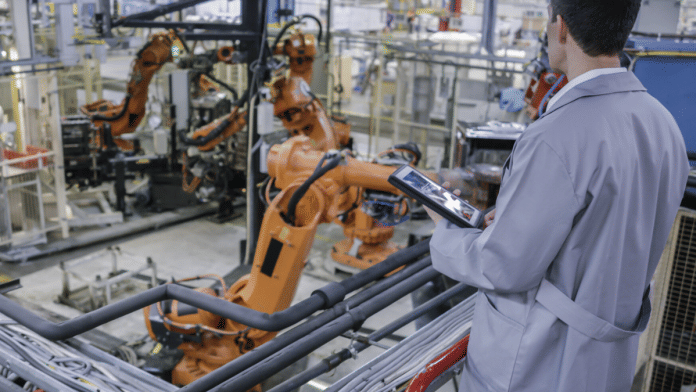Global industry is in the midst of a recruitment crisis.
Much has been written about a digital skills gap in terms of upskilling current employees so they are not cut out of the tech loop. I would argue the equally important topic is how we attract a new tech-savvy generation of workers to the industrial sector.
With a predicted global labour shortage of more than eight million in the manufacturing sector by 2030, we have a real workforce availability problem to address, one that requires all of us to become industrial revivalists. What do I mean by that? I mean we need to do a better job of articulating to young people why industry is the best place to be when it comes to innovation and cutting-edge technologies.
Industries in the intelligent age
Driven by AI, the internet of things and big data, today’s ‘intelligent’ industries are cleaner, safer and more agile. Images of the dirty, unsafe factories of the past are being replaced by the clean, efficient manufacturing spaces of the future, where humans and machines work side-by-side and in harmony. A new industrial identity is emerging.
This profound technological shift enhances productivity, reduces costs and promotes sustainable working practices that are increasingly appealing to the Gen Z and Gen Alpha workforce.
But are young people getting the message?
Of the two thousand American Gen Z workers surveyed by Soter Analytics in its 2023 Gen Z Industrial Work Report, only 14% said that industrial work is a career they would consider. This is a sobering statistic.
At the same time, it also revealed that 27% of Gen Z want to work for a company that is at the forefront of the latest technologies and products, including drones, connected devices, AI and virtual reality (VR).
Data science, AI, robotics, cybersecurity and cloud computing are increasingly common components of intelligent manufacturing. As industry relies on digital technology, robust cybersecurity measures are essential to protect sensitive data and maintain operational integrity against cyber threats. Cloud computing equally is needed to facilitate real-time data access and collaboration across manufacturing sites, supporting scalability and providing a platform for advanced analytics that helps manage resources and respond effectively to market demands. A new breed of data scientists and analysts is desperately needed.
When it comes to AI, automation has set the stage, streamlining processes, generating valuable data and enhancing operational efficiency to enable AI to focus on more complex decision-making, including analyzing and identifying patterns, making predictions and improving processes. This combination of AI and automation leads to intelligent automation, where machines not only perform tasks, but also learn and adapt over time, enhancing their performance.
So, as we compete for the hearts and minds of the digital generation who have grown up using technology to engage with and shape the world around them and who are comfortable working with innovations like artificial intelligence (AI), not in spite of it, this is a narrative we must tell more confidently if we are to attract them into the industrial workforce. This is a challenge we must win.
Furthermore, in the era where the gaming industry, social media, TikTok and internet influencers are all competing for the limited attention of Gen Z, we need to find ways to engage people differently. We must adapt and find methods, harnessing these types of influencer platforms to show off and shout louder about how automation and digitalization are transforming the world of industrial work for the better.
Spreading the sustainability message
Higher productivity, reliability and profitability have been key drivers since the dawn of the Industrial Revolution. Now, in the era of global warming, digitalization enables precise control over critical processes to reduce energy use – enhancing the sustainability of the entire industrial ecosystem.
In McKinsey’s 2024 report From hire to inspire: Getting – and keeping – Gen Z in manufacturing, Gen Z were the only cohort that consider ‘meaning’ as a key reason to take, keep or quit a job. More than other workers, Gen Z want to make a difference.
As we convene once again in Davos, Switzerland in January 2025 for the Annual Meeting of the World Economic Forum we must connect the dots between this year’s theme ‘Collaboration for the Intelligent Age’ and one of the key topics of discussion, ‘stewarding a just and inclusive energy transition’ to show the critical role industries have to play in achieving both of these visions and to help attract a new generation of digital native workers.
Automation helps to make this vision a reality. Augmenting human capabilities by carrying out dangerous, repetitive and low-value operations with precision and speed not only positively impacts productivity – it empowers workers, fosters economic growth and generates new job opportunities.
Digitalization also enables precise control over critical processes to reduce energy consumption, minimise waste and, ultimately, enhance the sustainability of the entire industrial ecosystem.
Access to data, the lifeblood of modern industry, is key to maintaining this momentum, ensuring that companies continue to produce commodities, which are essential to everyday life, efficiently and profitably, without compromising sustainability.
Winning the competition for talent
As industrial evangelists, we need to tell this compelling story about how, by aligning with sustainability principles, we can help foster an economy that creates economic growth – without costing the Earth.
All of us – manufacturers, technology providers and governments – must work together to help them do just that by changing the narrative around large-scale industry, positioning it not as a ‘necessary evil’, but as innovative, environmentally responsible and socially conscious – a catalyst for positive change.
Industries have the opportunity right now to bring Gen Z into its workforce, but employers need to shift to make this transition possible and ensure we attract the best talent today and in the future.
Barbara Frei, Executive Vice-President and Chief Executive Officer, Industrial Automation, Schneider Electric
This article is republished from the World Economic Forum under a Creative Commons license. Read the original article.






